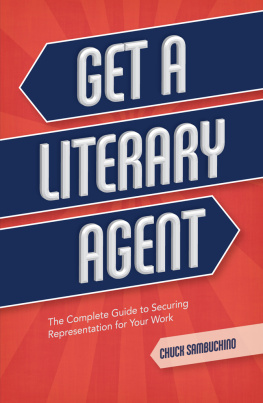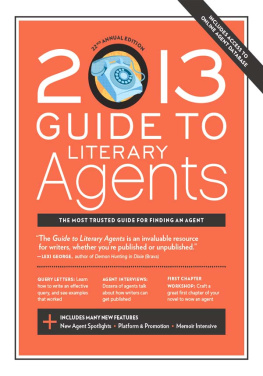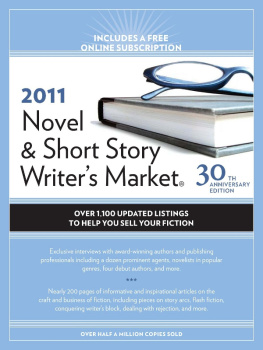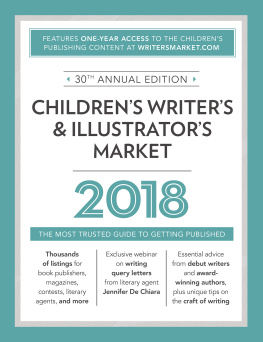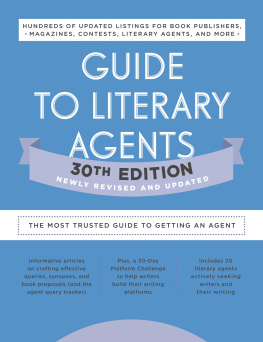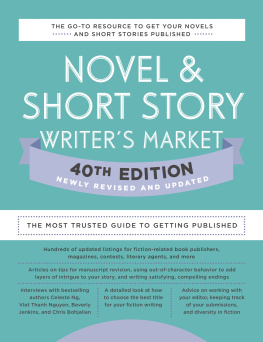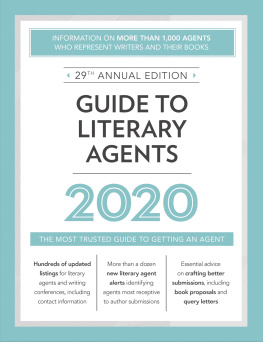Contents
Guide
GUIDE TO
LITERARY
AGENTS
2016
25th ANNUAL EDITION
Chuck Sambuchino, Editor

WritersDigest. com
Cincinnati, Ohio
CONTENTS
FROM THE EDITOR

PHOTO: Al Parrish
The same month that this edition of GLA is released (September 2015), I will also see my next humor book hit store shelves, as well. (Its a parody survival guide called When Clowns Attack, because lets be honestclowns are freaky.) I mention this good news because the first person I thank in the books acknowledgments section is, in fact, my agent. This is because she believed in the project from the beginning and helped me every step of the way. Even now, seven years into our partnership, she is still my advocate and right hand.
The story of my most recent book is just another reminder of how valuable a good literary agent can be to any writer seeking a traditional book deal. And if you, too, want to find a helpful and enthusiastic advocate, youve come to the right place. Welcome to the 25th edition of the Guide to Literary Agents. And as GLA reaches this quarter-century milestone, rest assured we have plenty of great instruction in these pages to help you get published: spotlights on new agents actively building their lists, query letter examples, synopsis writing tips, lists of writers conferences, and more. All in all, weve compiled individual info on more than 1,000 agents in this edition.
Please stay in touch with me through my blogguidetoliteraryagents.com/blogor on Twitter (@chucksambuchino) and continue to pass along feedback and success stories. Until we next meet, good luck on your writing journey. (And dont forget to access your free webinar download at www.writersmarket.com/gla16-webinar.)

Chuck Sambuchino
Editor, Guide to Literary Agents / Childrens Writers & Illustrators Market
Author, Get a Literary Agent (2015); Create Your Writer Platform (2012)
GETTING STARTED
HOW TO USE GUIDE TO LITERARY AGENTS
Searching for a literary agent can be overwhelming, whether youve just finished your first book or you have several publishing credits on your rsum. More than likely, youre eager to start pursuing agents and anxious to see your name on the spine of a book. But before you go directly to the listings of agencies in this book, take time to familiarize yourself with the way agents work and how you should approach them. By doing so, you will be more prepared for your search, and ultimately save yourself effort and unnecessary grief.
Read the articles
This book begins with feature articles that explain how to prepare for representation, offer strategies for contacting agents, and provide perspectives on the author/agent relationship. The articles are organized into three sections appropriate for each stage of the search process: Getting Started and Contacting Agents. You may want to start by reading through each article, and then refer back to relevant articles during each stage of your search.
Because there are many ways to make that initial contact with an agent, weve also provided a section called Perspectives. These personal accounts from agents and published authors offer information and inspiration for any writer hoping to find representation.
Decide what youre looking for
A literary agent will present your work directly to editors or producers. Its the agents job to get her clients work published or sold, and to negotiate a fair contract. In the Literary Agents section, we list each agents contact information and explain what type of work the agency represents as well as how to submit your work for consideration.
For face-to-face contact, many writers prefer to meet agents at Conferences. By doing so, writers can assess an agents personality, attend workshops and have the chance to get more feedback on their work than they get by mailing submissions and waiting for a response. The conferences section lists conferences agents and/or editors attend. In many cases, private consultations are available, and agents attend with the hope of finding new clients to represent.
FREQUENTLY ASKED QUESTIONS
- WHY DO YOU INCLUDE AGENTS WHO ARE NOT SEEKING NEW CLIENTS? Some agents ask that their listings indicate they are currently closed to new clients. We include them so writers know the agents exist and know not to contact them at this time.
- WHY DO YOU EXCLUDE FEE-CHARGING AGENTS? We have received a number of complaints in the past regarding fees, and therefore have chosen to list only those agents who do not charge reading fees.
- WHY ARE SOME AGENTS NOT LISTED? Some agents may not have responded to our requests for information. We have taken others out of the book after receiving serious complaints about them.
- DO I NEED MORE THAN ONE AGENT IF I WRITE IN DIFFERENT GENRES? It depends. If you have written in one genre and want to switch to a new style of writing, ask your agent if she is willing to represent you in your new endeavor. Most agents will continue to represent clients no matter what genre they choose to write. Occasionally, an agent may feel she has no knowledge of a certain genre and will recommend an appropriate agent to her client. Regardless, you should always talk to your agent about any potential career move.
- WHY DONT YOU LIST MORE FOREIGN AGENTS? Most American agents have relationships with foreign co-agents in other countries. It is more common for an American agent to work with a co-agent to sell a clients book abroad than for a writer to work directly with a foreign agent. We do list agents in the United Kingdom, Australia, Canada and other countries who sell to publishers both internationally and in the United States. If you decide to query a foreign agent, make sure they represent American writers (if youre American). Some may request to only receive submissions from Canadians, for example, or UK residents.
- DO AGENTS EVER CONTACT A SELF-PUBLISHED WRITER? If a self-published author attracts the attention of the media or if his book sells extremely well, an agent might approach the author in hopes of representing him.
- WHY WONT THE AGENT I QUERIED RETURN MY MATERIAL? An agent may not answer your query or return your manuscript for several reasons. Perhaps you did not include a self-addressed, stamped envelope (SASE). Many agents will discard a submission without a SASE. Or, the agent may have moved. To avoid using expired addresses, use the most current edition of Guide to Literary Agents or access the information online at WritersMarket.com. Another possibility is that the agent is swamped with submissions. An agent can be overwhelmed with queries, especially if the agent recently has spoken at a conference or has been featured in an article or book. Also, some agents specify in their listings that they never return materials of any kind.
Utilize the extras
Aside from the articles and listings, this book offers a section of



